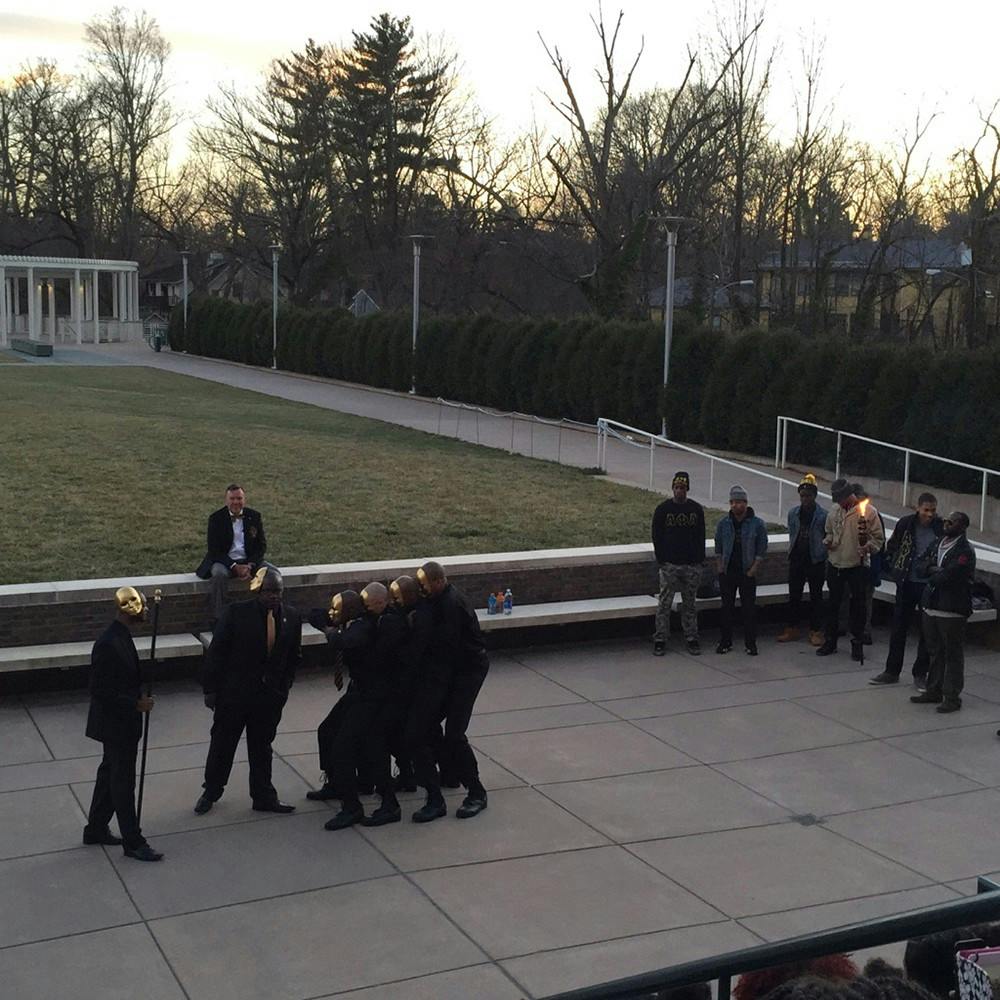The crowd at New Cabell Hall erupted into applause and loud cheers as masks were pulled off third-year College student Garrison Ambrose and his line brothers, revealing the new inductees of Alpha Phi Alpha fraternity. Alpha Phi Alpha was the first historically black fraternity this spring to celebrate its new members in a neophyte presentation last week.
“[A neophyte presentation] marks the culmination of the efforts of the young men who pursue Omega,” alumnus and Omega Psi Phi member Anthony Onuoha said. “It is the culmination of their effort, hard work and sacrifice of time.”
Most neophyte presentations include chanting of the fraternity’s history and lineage as well as stepping and dancing or singing. However, each fraternity brings its own unique traditions to the event. For example, Omega Psi Phi members pride themselves on having educational and entertaining presentations.
“Excellence, enthusiasm and methodical precision are expected,” Onuoha said. “During a [presentation] the expectations are high. There should be no mistakes. We want people to feel it. We want to move the audience.”
Starting from induction and even afterwards, Omega members work as a team to uphold the fraternity’s motto: “Friendship is essential to the soul.” Fourth-year Commerce student and Omega Psi Phi member Cecil White said he was drawn to this fraternity because of its motto and ideals.
“My process was one of the most life-changing things I have ever experienced,” White said. “It meant coming into my own as a man and committing myself to something that was bigger than me. It meant understanding the true meaning of friendship and brotherhood.”
Preparing for their presentation can be emotionally, mentally and, at times, physically toiling, White said. The preparation process is secretive, which dates back to the 1980s when historically black fraternities and sororities decided to move underground.
“The process is meant to challenge you, your mind and your spirit,” fourth-year College student and Alpha Phi Alpha member Colin Williams said. “You are finally finishing your process. The one thing you need to do is focus on the end-goal and stay true to the reasons why you wanted to join the fraternity.”
Once members enter the fraternity, they began participating in the organization’s service projects. Historically black fraternities are predominantly service organizations, rarely hosting parties and instead focusing on giving back to the community, Onuoha said.
“We take pride in service first and foremost,” Onuoha said. “We might have one to two parties a semester. IFC fraternities might have parties once every two weeks and only have one big service event a semester. With us, we have weekly servicing.”
While Inter-Fraternity Council chapters recruit first years, chapters which are part of the National Pan-Hellenic Council initiate third or fourth years. Black fraternities and sororities look for individuals who have already established themselves within the University community, as becoming a member is a life-long commitment.
“They say the real work starts after you graduate,” White said. “The vast majority of Omega members are graduates. We bring in more initiates through graduate chapters than undergraduate chapters.”
Although black fraternities differ from IFC organizations, they are subject to the same regulations. For example, after the publication of a Rolling Stone article detailing allegations of sexual assault at Phi Kappa Psi fraternity, frustration resonated among members of the National Pan-Hellenic Council when President Sullivan suspended all fraternal events.
“We were involved in absolutely none of the conversations that took place regarding University-wide remediation on a wide scale,” White said. “We weren’t included in the conversation and yet we still faced the same sanctions the IFC did in terms of being suspended. I do think that we are underrepresented and underacknowledged.”
In the future, Onuoha said black fraternity members hope to see greater representation within the University community and collaboration among different councils.
“[I hope to see] more interaction between the IFC and the NPHC,” Onuoha said. “It doesn’t happen frequently enough. Also, general knowledge about each other [is important]. Some NPHC organizations don’t know what IFC organizations do and they just stereotype. I feel like people just need a better understanding of [both].”







